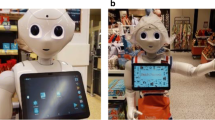
Overview
Part of the book series: Lecture Notes in Computer Science (LNCS, volume 13817)
Part of the book sub series: Lecture Notes in Artificial Intelligence (LNAI)
Included in the following conference series:
Conference proceedings info: ICSR 2022.
Access this book
Tax calculation will be finalised at checkout
Other ways to access
About this book
The 111 papers presented in the proceedings set were carefully reviewed and selected from 143 submissions. The contributions were organized in topical sections as follows: Social robot navigation and interaction capabilities (voice, tactile); Social robot perception and control capabilities; Investigating non verbal interaction with Social robots; Foster attention and engagement strategies in social robots; Special Session 1: Social Robotics Driven by Intelligent Perception and Endogenous Emotion-Motivation Core; Special Session 2: Adaptive behavioral models of robotic systems based on brain-inspired AI cognitive architectures; Advanced HRI capabilities for interacting with children; Social robots as advanced educational tool; Social robot applications in clinical and assistive scenarios; Collaborative social robots through dynamic game; Design and evaluate user’s robot perception and acceptance; Ethics, gender & trust in social robotics.
Similar content being viewed by others
Keywords
Table of contents (50 papers)
-
Front Matter
-
Social Robot Navigation and Interaction Capabilities (Voice, Tactile)
-
Front Matter
-
-
Social Robot Perception and Control Capabilities
-
Front Matter
-
Other volumes
-
Social Robotics
-
Social Robotics
Editors and Affiliations
Bibliographic Information
Book Title: Social Robotics
Book Subtitle: 14th International Conference, ICSR 2022, Florence, Italy, December 13–16, 2022, Proceedings, Part I
Editors: Filippo Cavallo, John-John Cabibihan, Laura Fiorini, Alessandra Sorrentino, Hongsheng He, Xiaorui Liu, Yoshio Matsumoto, … Shuzhi Sam Ge
Series Title: Lecture Notes in Computer Science
DOI: https://doi.org/10.1007/978-3-031-24667-8
Publisher: Springer Cham
eBook Packages: Computer Science, Computer Science (R0)
Copyright Information: The Editor(s) (if applicable) and The Author(s), under exclusive license to Springer Nature Switzerland AG 2022
Softcover ISBN: 978-3-031-24666-1Published: 01 February 2023
eBook ISBN: 978-3-031-24667-8Published: 31 January 2023
Series ISSN: 0302-9743
Series E-ISSN: 1611-3349
Edition Number: 1
Number of Pages: XXIII, 593
Number of Illustrations: 26 b/w illustrations, 205 illustrations in colour
Topics: Artificial Intelligence, Computer Appl. in Social and Behavioral Sciences, User Interfaces and Human Computer Interaction, Computer Communication Networks, Special Purpose and Application-Based Systems, Image Processing and Computer Vision



